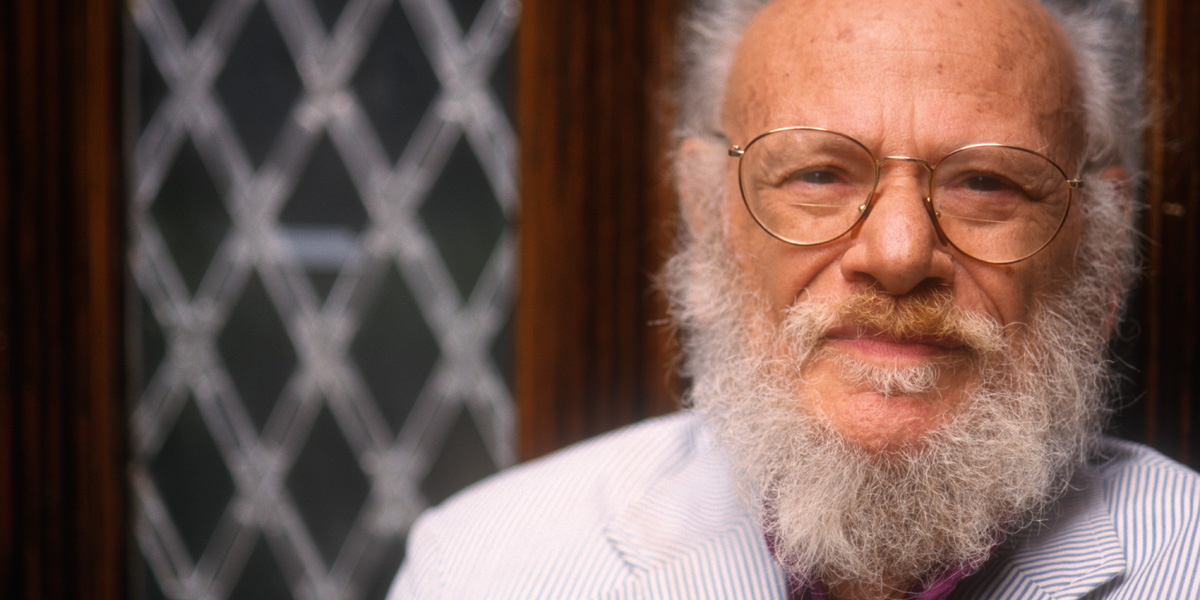REDISCOVER Ralph Shapey: Radical Traditionalist

June 10, 2021
If composer Ralph Shapey (1921–2002) was anything, he was a fighter—a disposition that may have been instilled in him at birth. Two weeks after he was born, he contracted double pneumonia and was not expected to live. His doctors advised his parents to start planning for another child. Instead, according to Shapey, his father held him by the ankles and “beat the hell out of him” until he started crying and coughing, at which point his lungs cleared and he recovered.
To whatever degree this episode might be apocryphal it wasn’t the last time the famously combative composer brushed up against death. He was at the MacDowell Colony in 1977, hard at work on The Covenant, when he received a hysterical call from colleagues who had read his obituary in a newspaper. (Apparently, a journalist had read that a publishing company had decided to publish Shapey’s music and assumed this meant he had died.) In the space between Shapey’s early brush with death and his final one—from heart and kidney failure—on June 16, 2002, he built a storied and, at times, controversial, career on no one’s terms but his own.
Shapey, who would have turned 100 this year, was born in Philadelphia and was somewhat of a prodigy. He began violin at age seven, studying with Emanuel Zeitlin of the famed Curtis Institute. He recalled that his impulse to study composition came during a moment of deep self-doubt while on the conducting podium. He was sixteen and conducting Beethoven’s eighth symphony when his inner voice asked him what right he had to be conducting the work of a great master when he knew nothing about what it took to compose such a work. That impulse ultimately led Shapey to study composition with Stefan Wolpe, himself a composer inclined to ignore rules and conventions.

Ralph Shapey at the University of Chicago, 1997.
Wolpe, however, would be Shapey’s only composition teacher. Despite a career in which he held positions and guest posts at many of America’s most revered universities, received a MacArthur prize, and was elected to the American Academy of Arts and Letters (1989) and the American Academy of Arts and Sciences (1994), Shapey never had more than a high school diploma to his name.
Shapey was a fighter in a more literal sense as well, having spent three years in U.S. Army as a soldier in the Second World War. Later, he imposed a ban on the performance of his own music in protest of American involvement in the Vietnam War. And he more quietly protested when the Pulitzer Prize board overruled its own music committee’s recommendation to award Shapey the music prize for Concerto Fantastique and instead gave the award to Wayne Peterson. Thereafter, Shapey included the Pulitzer Prize for music among his list of accomplishments but added “robbed” in parentheses.
Though his music sounds thoroughly modern, Shapey relied on structural techniques derived from earlier periods and conceived of his works as grand, emotional arcs. Because of this, he often thought of himself as a kind of Romantic composer who used a contemporary musical language. This is not to be confused with neoclassicism, which he viewed speciously as “wrong-note composers” (“they write a perfectly good piece of music in the traditional, tonal system, and then they add some wrong notes here and there, to make it sound like modern music”). Shapey challenged himself relentlessly and held fast to his credo that “the music must speak for itself.” And speak it does.
Composer Ralph Shapey discusses his deeply personal and evocative meditation on the Holocaust, The Covenant.
Included in the Milken Archive are two of Shapey’s most important works that reflect his penchant for combining texts from multiple sources to form a philosophical idea. Psalm II for chorus, oboe, piano, and string quartet combines excerpts from Walt Whitman, Thomas of Celano, the Rebbe of Kotzk, and others, to express his despair at a broken world as well as hope for its repair. The Covenant draws on an eclectic range of poems, biblical texts, and inscriptions left on cellar walls where Jews had hidden during the Holocaust. The Covenant is a musical and emotional tour de force lasting more than forty-two minutes, with themes that address the Holocaust, redemption in the rebirth of Israel, and the oneness of humankind. Shapey was a proud and devoted Jew, but he understood his own experience as part of the broader human experience. When asked about the question of Jewish music in his 1997 oral history with the Milken Archive, Shapey simply responded “I don’t have the slightest idea.”
Beyond the two works in the Milken Archive, Shapey’s catalog includes some 200 compositions for many instrument and voice combinations. Many of those works’ titles (Incanations, Rituals, Praise) reveal a composer deeply concerned with matters of religion, faith, and the Jewish experience. The handful of recordings that exist uncover an uncompromising artist deeply committed to producing nothing but his absolute best.
Explore More on Ralph Shapey
